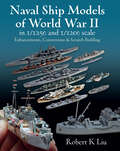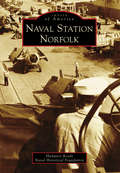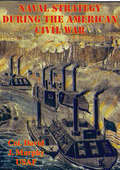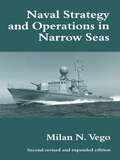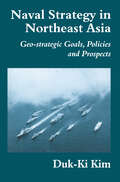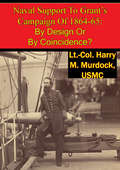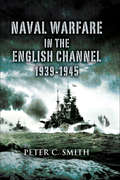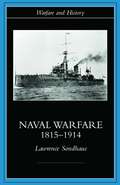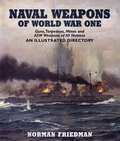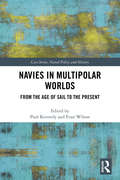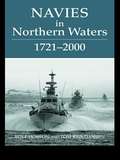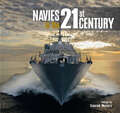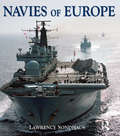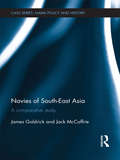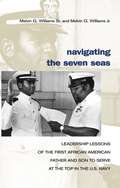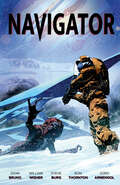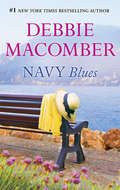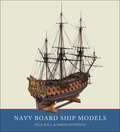- Table View
- List View
Naval Science 1: Introduction to Navy Junior Reserve Officers Training
by PearsonNAVAL SCIENCE 1: INTRODUCTION TO THE NAVY JUNIOR RESERVE OFFICERS' TRAINING CORPS 3RD EDITION
Naval Science 2: Maritime History, Leadership, and Nautical Sciences for the NJROTC Student (3rd Edition)
by Richard R. HobbsNaval Science 2, 3rd Edition is the new edition of a textbook that has long been a staple work for the NJROTC program. It provides a survey of early maritime history as well as the history of the U. S. Navy. In addition, this textbook covers the key leadership precepts and nautical sciences required by second-year students in the Navy high school NJROTC program.
Naval Science 3: Naval Knowledge, Leadership, And Nautical Skills For The Njrotc Student
by Richard R. HobbsNaval Science, Volume 3
Naval Ship Models of World War II in 1/1250 and 1/1200 Scales: Enhancements, Conversions & Scratch Building
by Robert K. LiuA guide for collectors and modelers—packed with photos, technical information, practical advice, and history.The origins of 1/1250 and 1/1200 scale models can be traced back to the first years of the twentieth century and their use as identification aids by the military during the First World War. When peace came, the manufacturers aimed their increasingly sophisticated products at collectors, and ever since then acquiring, enhancing, modifying, or scratch-building miniature ship models has been an avidly pursued hobby around the world.This new book focuses on models of the ships of the Second World War, and the author addresses all the practical issues that might confront collectors who like to enhance, convert, and modify their models, or even scratch-build models of ships not commercially available.The book covers both Allied and Axis warships, naval airplanes, merchant conversions, and even an Italian armed schooner, and provides historic and technical information on the ships represented as well as practical advice on modeling them—including twenty-five chapters covering everything from initial production techniques such as spin casting, silicon mold casting, resin casting, die-casting, plastic mold injection, and 3D printing through techniques for enhancing and modifying models to eventually researching and scratch-building an uncommon ship or type. The focus is always on particular vessels and the vast array covered builds into a fascinating panorama of the vessels that fought across the world’s oceans in that era.The combination of intriguing background and historical information, combined with detailed practical information and more than 300 stunning photographs, makes this book irresistible to collectors, modelers, or anyone with an interest in the navies of the Second World War.
Naval Station Norfolk (Images of America)
by Hampton Roads Naval Historical FoundationNaval Station Norfolk is the world's largest naval station, supporting the Navy ships, submarines, and aircraft of the US Fleet Forces Command with a multitude of facilities and services. This shore establishment, located on the historic harbor of Hampton Roads, has remained vital to the Navy since its foundation in 1917. Once established, the naval station focused on serving the fleet in four areas: aviation, recruit training, a submarine base, and a supply base. Men and women of the station continued to work on these and other activities through the pressures of World War I, the Depression, World War II, and wars in Korea, Vietnam, Iraq, and Afghanistan. They made sure that ships and aircraft were successfully deployed to the far reaches of the globe--the nation's indispensable response to international conflicts. Nowadays, the station is the hub for Navy logistics supporting the defense of the entire Atlantic area, from the North Pole to the South Pole.
Naval Strategy During The American Civil War
by Col. David J. Murphy USAFThe objective of the research project is to examine how the Union and Confederate naval strategies and new naval technologies affected the conduct of the American Civil War. With regard to the Union Navy's strategy, the effectiveness of the blockade, Western River Campaign, and amphibious operations were examined. Discussions on the Union blockade also touch on the effectiveness on Confederate blockade runners. The Confederate strategies of using privateers and commerce raiders are examined. Confederate coastal and river defenses are examined within the context of new technology, specifically with respect to ironclad ships and the use of mines, torpedoes, and submarines.The paper shows how naval strategy did play a major role in the outcome of the Civil War. Although it cannot be said that naval strategies were singularly decisive, they certainly were vitally important and often overlooked in history books.
Naval Strategy and Operations in Narrow Seas
by Milan N. VegoMany books and articles have been written on wars in narrow seas. However, none deals in any comprehensive manner with the problems of strategy and conduct of naval operations. The aim of this book is to explain in some detail the characteristics of a war fought in narrow seas and to compare and contrast strategy and major operations in narrow seas and naval warfare in the open ocean..
Naval Strategy in Northeast Asia: Geo-strategic Goals, Policies and Prospects (Cass Series: Naval Policy and History)
by Duk-Ki KimOver the past decade, Northeast Asia has been dominated by quite significant strategic change, which is ongoing and brings with it many uncertainties. naval capabilities in Northwest Asia are instrumental in promoting maritime security interests - helping to build a stable security environment through active participation in regional naval co-operation. This landmark book explores the region's maritime peace and stability, and examines in depth the strategic, military and apolitical issues that underpin any effort to develop maritime co-operation.
Naval Support To Grant’s Campaign Of 1864-65: By Design Or By Coincidence?
by Lt.-Col. Harry M. Murdock USMCBy 1863, the Civil War was basically a stalemate between the two belligerents. Though the Union forces had achieved some success in conducting joint expeditions that resulted in securing the Mississippi River and the majority of the Southern ports, the major land armies of the Union were generally ineffective. In March 1864, General Ulysses S. Grant was named General-in-Chief of the Union army; he designed a campaign for future operations that called for synchronized operations by the Union armies supported by the Union navy. This monograph examines the naval support to Grant's campaign to determine whether or not the provided support was by design or just coincidence.The monograph initially establishes the theater of war setting that Grant inherited when he assumed the billet of General-in-Chief. This is followed by a summary of the campaign from a naval perspective. The monograph concludes with an analysis of the naval support provided to the campaign using the four components of a successful campaign espoused in Lieutenant Colonel James Dubik's "A Guide to the Study of Operational Art and Campaign Design."Based on the analysis, it is evident that the naval support was provided by design. Grant demonstrated an extraordinary ability to visualize operations in the entire theater of war. He fully understood and appreciated the usefulness of the sea dimension and exploited its use. The Union navy's command of the seas and resourcefulness allowed Grant to maintain his freedom of action, to operate from secure bases of operation, and to destroy the South's capacity to wage war.
Naval Warfare 1919-45: An Operational History of the Volatile War at Sea
by Malcolm H. MurfettNaval Warfare 1919–45 is a comprehensive history of the war at sea from the end of the Great War to the end of World War Two. Showing the bewildering nature and complexity of the war facing those charged with fighting it around the world, this book ranges far and wide: sweeping across all naval theatres and those powers performing major, as well as minor, roles within them. Armed with the latest material from an extensive set of sources, Malcolm H. Murfett has written an absorbing as well as a comprehensive reference work. He demonstrates that superior equipment and the best intelligence, ominous power and systematic planning, vast finance and suitable training are often simply not enough in themselves to guarantee the successful outcome of a particular encounter at sea. Sometimes the narrow difference between victory and defeat hinges on those infinite variables: the individual’s performance under acute pressure and sheer luck. Naval Warfare 1919–45 is an analytical and interpretive study which is an accessible and fascinating read both for students and for interested members of the general public.
Naval Warfare in the 20th Century 1900-1945
by Gerald JordanThe development of naval warfare from the beginning of the 20th century to the end of World War II is covered in great detail.
Naval Warfare in the English Channel, 1939–1945
by Peter C. SmithFrom the year 1066 the English Channel has provided Great Britain with a natural defensive barrier, but never more than in the early days of World War Two. This book relates how the Royal Navy defended that vital seaway throughout the war. From the early days of the Dover Patrols, through the traumas of the Dunkirk evacuation, the battles of the Channel convoys; the war against the E-boats and U-boats; the tragic raids at Dieppe and St Nazaire; the escape of the German battle-fleet; coastal convoys; the Normandy landings and the final liberation of the Channel Islands. Many wartime photographs, charts and tables add to this superb account of this bitterly contested narrow sea.
Naval Warfare, 1815-1914 (Warfare and History)
by Lawrence SondhausThis book looks at the transition of wooden sailing fleets to the modern steel navy. It details the technological breakthroughs that brought about this change - steampower, armour, artillery and torpedoes, and looks at their affect on naval strategy and tactics.Part of the ever-growing and prestigious Warfare and History series, this book is a must for enthusiasts of military history.
Naval Weapons of World War One: Guns, Torpedoes, Mines and ASW Weapons of All Nations (An Illustrated Directory)
by Norman FriedmanAn in-depth reference to the naval weapons used by Britain, Germany, the US, and the other combatants in the Great War, with photos: &“Superb…invaluable.&”—History of War Although the Great War might be regarded as the heyday of the big-gun at sea, it also saw the maturing of underwater weapons, the mine and torpedo, as well as the first signs of the future potency of air power. Between 1914 and 1918 weapons development was both rapid and complex, so this book has two functions: on the one hand it details all the guns, torpedoes, mines, aerial bombs and anti-submarine systems employed during that period; but it also seeks to explain the background to their evolution: how the weapons were perceived at the time and how they were actually used. This involves a discussion of tactics and emphasizes the key enabling technology of fire control and gun mountings. In this respect, the book treats the war as a transition from naval weapons which were essentially experimental at its outbreak to a state where they pointed directly to what would be used in World War II. Based largely on original research, this sophisticated book is more than a catalogue of the weapons, offering insight into some of the most important technical and operational factors influencing the war at sea.
Navalism and the Emergence of American Sea Power: 1882-1893
by Mark Russell ShulmanThis book covers the range of US naval development from the beginning of the Navalism movement to the influence of the Mahanian doctrine on naval issues.
Navies in Multipolar Worlds: From the Age of Sail to the Present (Cass Series: Naval Policy and History)
by Paul Kennedy Evan WilsonRecent challenges to US maritime predominance suggests a return to great power competition at sea, and this new volume looks at how navies in previous eras of multipolarity grappled with similar challenges. The book follows the theme of multipolarity by analysing a wide range of historical and geographical case studies, thereby maintaining the focus of both its historical analysis and its policy implications. It begins by looking at the evolution of French naval policy from Louis XIV through to the end of the nineteenth century. It then examines how the British responded to multipolar threat environments, convoys, the challenges of demobilization, and the persistence of British naval power in the interwar period. There are also contributions regarding Japan’s turn away from the sea, the Italian navy, and multipolarity in the Arctic. This volume also addresses the regional and global distribution of forces; trade and communication protection; arms races; the emergence of naval challengers; fleet design; logistics; technology; civil-naval relations; and grand strategy, past, present, and future. This book will be of much interest to students of naval history, strategic studies and international relations history, as well as senior naval officers.
Navies in Northern Waters (Cass Series: Naval Policy and History #Vol. 26)
by Rolf Hobson Tom KristiansenNavies in Northern Waters is a collection of articles covering the roles played by the secondary navies of northern European powers and the United States within the maritime balance of power. The contributions covering the 18th and 19th centuries focus on their relations with each other as they sought to create a counterweight to the dominant naval power of Britain. The inter-war years are treated from the perspectives of international disarmament efforts within the framework of collective security, and the subsequent naval rivalry in the Baltic area in the years leading up to the Second World War. For the post-1945 period, the contributions concentrate on superpower rivalry in northern waters during the Cold War, the changing aspects of security policy since the collapse of the Soviet Union and the particular challenges facing small coastal states policing extensive waters of increasing economic importance.
Navies in the 21st Century
by Conrad Waters&“A range of naval experts . . . build[s] a diverse and deeply-thought out picture of where maritime warfare is now and where it is likely to go.&”—Army Rumour Service What is the purpose of navies in the modern world, and what types of warship does this require? This book tackles these questions by looking at naval developments, both technological and operational, in the quarter century since the end of the Cold War. It provides the overall political and economic context, assesses significant naval operations from the first Gulf War to Russia&’s annexation of Crimea, reviews changes in the objectives and composition of the principal fleets, describes major design developments amongst the main warship types, and examines wider technological and operational developments, including naval aviation, shipbuilding and manning. &“A high quality publication with a great many superb photographs. For those wishing to keep fully informed on world naval affairs, it is excellent value and strongly recommended.&”—Scuttlebutt &“This new book follows the successful approach and format of the very popular naval annual Seaforth&’s World Naval Review. Under the same editor, a new team of specialists have been assembled to write authoritative articles in their particular fields of expertise. The absorbing text is fully supported by many outstanding images—Most Recommended.&”—Firetrench &“Provides a most useful contextual analysis of the post-Cold War period, explaining how technological developments and a range of world events have variously shaped the fleets of today.&”—Warship
Navies of Europe
by Lawrence SondhausEurope ruled the waves for most of the modern era and even when its navies were eclipsed in size by the US force, they continued to dominate world wars. In this unique history of Europe's naval forces, Larry Sondhaus charts the development of naval warfare from the transition to steam to recent actions in the Persian Gulf. Combining detailed technical information with an in-depth comparison of warfare and tactics across some of the key conflicts of the modern world, this is an absorbing account of European and British seapower, past and present.
Navies of South-East Asia: A Comparative Study (Cass Series: Naval Policy and History)
by James Goldrick Jack McCaffrieThis book provides a comprehensive survey of the development and operations of the navies of South-East Asia since the end of World War II. The navies of South-East Asia have rarely been the subject of systematic attention but, as the maritime strategic balance within Asia becomes more complex and open to challenge through the rise of China, they will play increasingly significant roles. While most have had only limited strength in the past, the majority are acquiring new capabilities, notably submarines, which will profoundly alter their ability to influence events. This volume outlines the difficulties that each navy has faced in developing capability in competition, not only with local armies and air forces, but with other national requirements. The authors analyse the way in which each has been shaped by history and by changing maritime strategic concepts, particularly through developments such as the 1982 Law of the Sea Convention. Drawing upon this contextual information, the book goes on to examine how the navies are likely to develop in the future, what new challenges they will face and the nature of the roles they will play within a region of increasing global strategic significance. This book will be of much interest to students of naval policy, SE Asian politics, regional security, strategic studies and IR in general.
Navigating the Seven Seas
by Melvin G. Williams Jr. Melvin G. Williams Sr.Two high-achieving African-Americans in the U.S. Navy share their leadership experiences over nearly sixty consecutive years of service. Melvin G. Williams Sr. served in the Navy from 1951 to 1978 with a final assignment as a Command Master Chief. His son, Melvin G. Williams Jr., served from 1978 to 2010 with a final assignment as Commander, U.S. Second Fleet. Their book describes how they navigated through the ranks by employing what they call the Seven Cs of leadership: Character, Competence, Courage, Commitment, Caring, Communicating, and Community. The authors contend that their leadership principles can be learned, practiced, and refined for any profession.
Navigator
by John BrunoAn alien navigator, captured in battle on Jupiter&’s fourth moon, Europa, seeks sanctuary. In return, the alien will provide his advanced technology to help defend mankind from the alien force that enslaved him and has come to destroy us.In this backdrop is a story of love and reconciliation between a young Marine officer—placed in command of Earth&’s forces—his estranged wife, and Amy...the daughter he&’s never met.
Navy Blues
by Debbie MacomberAvailable as an ebook for the very first time! NAVY BLUES, the second in Debbie Macomber's popular series of Navy romances. She needed just one night with him... Despite her ex-husband's stubbornness, Carol Kyle knew he'd be the perfect man to father the child she so desperately wanted. Yet she also realized that this strong, honorable man would never allow his child to be raised without a father. So Carol needed to plot, to plan, to maneuver, to seduce Steve into her bed one last time... And then once more. Still, the passion when they were together had never been the problem; it was the absences that tore them apart. Had they grown enough to risk trying again--especially when Carol's plan seemed about to work?
Navy Board Ship Models
by Simon Stephens Nick BallA beautifully illustrated history of the early ship models of the Royal Navy that are prized today as works of art. From about the middle of the seventeenth century, the Royal Navy&’s administrators began to commission models of their ships that were accurately detailed and, for the first time, systematically to scale. These developed a recognized style, which included features like the unplanked lower hull with a simplified pattern of framing that emphasized the shape of the underwater body. Exquisitely crafted, these were always rare and highly prized objects—indeed, Samuel Pepys expressed a profound desire to own one, and today they are widely regarded as the acme of the ship modeler&’s art. Today, examples are the highlights of collections across the world, valued both as art objects and as potential historical evidence on matters of ship design. However, it was only recently that researchers began to investigate the circumstances of their construction, their function, and the identities of those who made them. This book, by two curators who have worked on the world&’s largest collection of these models at the National Maritime Museum in Greenwich, England, summarizes the current state of knowledge, outlines important discoveries, and applies this newfound understanding to many of the finest models in the collection. As befits its subject, Navy Board Ship Models is visually striking, with numerous color photographs that make it as attractive as it is informative to anyone with an interest in modelmaking or historic ships.
Navy Brides (Navy Omnibus #1)
by Debbie MacomberThis volume contains Navy Wife, Navy Blues and Navy Brat. In these three romances, men and women must balance love for each other with love for their country during their military deployment in the Navy.



